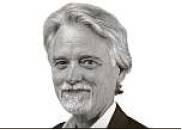A way to boost grid reliability, if allowed
CHRIS TOMLINSON COMMENTARY
Six years ago, Enchanted Rock CEO Thomas McAndrew took me to a Houston-area H-E-B grocery store to see a new kind of backup generator capable of powering large facilities and providing electricity to the Texas grid when it was most needed.
Hurricane Harvey struck three months later, and the natural gas generators were 100 percent effective in keeping stores open. Then, when a winter storm struck in February 2021, killing more than 200 people, Enchanted Rock kept critical facilities operational from its Houston operations center.
Last week, McAndrew took me to Fort Bend Levee Improvement District No. 2, where the company he founded provides 12 megawatts of backup power. When the electric grid runs low on electricity, the natural gas generators provide power to the grid. When flooding strikes, the units ensure the pumping station can move 1 million gallons a minute away from nearby homes.
Because Enchanted Rock serves two customers — the grid and the pumping station — the levee district saved $7 million on the project.
Today, the company is outgrowing the startup label with 1,000 units at 275 sites in 11 states. Enchanted Rock provides a fabulous example of how demand response from small, distributed generators can provide affordable, reliable power while fighting climate change.
“When we were doing this, we really didn’t have any competition,” McAndrew said. “And now, we’re getting a lot of competition.”
On the grid operated by the Electric Reliability Council of Texas most energy shortages last less than four hours when demand peaks on the hottest days or coldest nights. How to address those peaks without overbuilding is the challenge in keeping electricity affordable.
Advocates for modernizing the grid argue that the most cost-effective way is to pay customers to reduce demand and fire up small, distributed generators and batteries for the handful of hours when the grid is stressed. Enchanted Rock offers both demand response and distributed generation, as the industry calls them.
Enchanted Rock can take 500 megawatts of electricity offline, enough to power 100,000 homes, when ERCOT’s supply gets tight and provide extra juice. The generators can run as long as the natural gas keeps flowing, for days at a time.
Distributed generation also provides power locally when lines go down or a transformer blows out. McAndrew said that out of 250 sites, two-to-five generators kick in a day due to small, local outages, with generators typically running 200 to 400 hours a year.
The 2021 winter storm proved distributed generation’s value. Enchanted Rock generators kept H-E-Bs open in San Antonio and Houston. During last month’s ice storm in Austin, where Enchanted Rock couldn’t operate due to local rules, the lights went out for days.
“Remember all the people going through the dumpsters because HE-B had thrown all that food out?” McAndrew asked.
While natural gas generators are cleaner than diesel, they emit greenhouse gases. McAndrew said his engineers have reduced emissions from their patented generators by 90 percent. In California, they run on renewable natural gas from landfills and composting.
Big energy companies tout clean hydrogen as a replacement for natural gas. Enchanted Rock has already run its generators on a blend of 20 percent hydrogen without any problem, and McAndrew plans to offer hydrogen-fuel versions when the market demands them.
Orders for new units doubled last year, and McAndrew said he expects them to double again in 2023. But regulatory barriers remain.
Fees for connecting to the grid can be outlandish. Rules around providing power during emergencies were written for big projects, not distributed generation. Payments for taking big loads offline don’t kick in until the grid is in trouble. In some places, small power plants cannot sell power to the grid.
The Texas Legislature and the Public Utility Commission are overhauling ERCOT’s wholesale electricity market, but they focus on rewarding big generation plants while punishing renewable energy facilities. Proposed rules could impinge on Enchanted Rock’s business plan, while lawmakers have shown little interest in new solutions like distributed generation and demand response.
Climate change activists are clamoring for rules encouraging a smarter grid, but McAndrew has never waited for the Legislature.
“I don’t think there’s anything that we can do to really influence the outcome other than just keep doing what we’re doing and talking about it,” McAndrew said. “It actually matters to the communities we serve that we can keep doing this.”
Sometimes the best you can do is take your product to market and let customers decide.
Chris Tomlinson, named 2021 columnist of the year by the Texas Managing Editors, writes commentary about money, politics and life in Texas. Sign up for his “Tomlinson’s Take” newsletter at Houston-Chronicle.com/ Tomlinson-Newsletter or Express-news.com/ TomlinsonNewsletter.twitter.com/cltomlinsonctomlinson@hearstcorp.com
